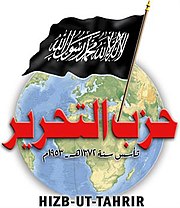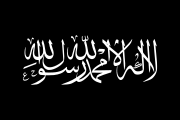
Back حزب التحرير Arabic حزب التحرير ARZ Hizb ut-Tahrir AST হিযবুত তাহরীর Bengali/Bangla Hizbu et-Tahrir BS Hizb ut-Tahrir Catalan Hizb ut-Tahrir Czech Hizb ut-Tahrir Danish Hizb ut-Tahrir German Hizb ut-Tahrir Spanish
Hizb ut-Tahrir حِزبُ التّحرير | |
|---|---|
 | |
| Leader | Ata Abu Rashta |
| Founder | Taqi al-Din al-Nabhani |
| Founded | 1953 in East Jerusalem, Jordan |
| Headquarters | Beirut, Lebanon |
| Membership | 10,000[1] – 1 million[2] |
| Ideology |
|
| Religion | Islam |
| Party flag | |
 | |
| Website | |
| hizb-ut-tahrir | |
| Part of a series on Islamism |
|---|
|
|
Hizb ut-Tahrir (HT; Arabic: حزب التحرير, romanized: Ḥizb at-Taḥrīr, lit. 'Party of Liberation') is an international pan-Islamist and Islamic fundamentalist political organization whose stated aim is the re-establishment of the Islamic caliphate to unite the Muslim community (called ummah)[3] and implement sharia globally.[a][b]
Hizb ut-Tahrir was founded in 1953 as a political organization in then-Jordanian-controlled Jerusalem by Taqi al-Din al-Nabhani, a Palestinian Islamic scholar from Haifa who was educated in Egypt and served as a qadi (religious court judge) in Mandatory Palestine.[31][32] He formulated a program and a "draft constitution" for the establishment of a Caliphate.[4][10][11][12] The organization sees world history as an eternal conflict between Islam and non-believers, with the state system considered a historical assault on Islam. The group views Jihad as an essential aspect of its vision and considers it an imperative duty aimed at combating disbelief until all submit to Islamic rule, making no distinction between the violent and spiritual dimensions of Jihad. As an initial step, HT directs attention to the 'near enemy', advocating the removal of rulers "pretending to be Muslims", a step they consider a prerequisite for the global spread of Islam.[32]
Since 1953, Hizb ut-Tahrir has spread to more than 50 countries, and has a membership estimated to be between "tens of thousands"[1] to "about one million".[2] Hizb ut-Tahrir is active in Western countries, including the UK, and also in several Arab and Central Asian countries despite being banned by some governments. Members typically meet in small private study circles, but in countries where the group is not illegal, it also engages with the media and organizes rallies and conferences.[33] The organization's leadership is centered in Jordan, with additional headquarters in London. This dual presence leverages the relative freedom in Europe to oversee activities in Muslim nations where HT faces more stringent restrictions.[32]
Hizb ut-Tahrir has been banned in Bangladesh,[34] China,[35] Russia,[36] Pakistan,[37] Germany,[38][39] Turkey,[40] the United Kingdom,[41] Kazakhstan[42] and "across Central Asia",[43][44] Indonesia,[45][46] and all Arab countries except Lebanon, Yemen and the UAE.[47][48] In July 2017, the Indonesian government revoked Hizb ut-Tahrir's legal status, citing incompatibility with government regulations on extremism and national ideology.[45]
- ^ a b Cite error: The named reference
filiu-2008was invoked but never defined (see the help page). - ^ a b Malik, Shiv (13 September 2004). "For Allah and the caliphate". New Statesman. Retrieved 15 January 2024.
- ^ a b c "Can the Muslim world really unite?". Hizb ut-Tahrir Britain. 4 March 2010. Retrieved 15 January 2016.
- ^ a b c d Commins, David (1991). "Taqi al-Din al-Nabhani and the Islamic Liberation Party" (PDF). The Muslim World. 81 (3–4): 194–211. doi:10.1111/j.1478-1913.1991.tb03525.x. Retrieved 6 March 2016.
- ^ a b c Cite error: The named reference
DENMARKwas invoked but never defined (see the help page). - ^ a b Cite error: The named reference
NOJEWSwas invoked but never defined (see the help page). - ^ a b Cite error: The named reference
eradicatewas invoked but never defined (see the help page). - ^ Cite error: The named reference
islamicsupremacywas invoked but never defined (see the help page). - ^ Cite error: The named reference
DCHT2011:Article 16was invoked but never defined (see the help page). - ^ a b Draft Constitution of the Khilafah State, 2011: Article 26
- ^ a b an-Nabhani, Taqiuddin (1998). The Islamic State (PDF). London: De-Luxe Printers. pp. 240–276. ISBN 978-1-89957-400-1. Archived from the original (PDF) on 6 December 2018. Retrieved 14 January 2016.
- ^ a b an-Nabhani, The Islamic State, 1998: pp. 240–276
- ^ Cite error: The named reference
glazov-trollwas invoked but never defined (see the help page). - ^ Cite error: The named reference
lenientwas invoked but never defined (see the help page). - ^ Cite error: The named reference
HT-67was invoked but never defined (see the help page). - ^ a b c Cite error: The named reference
LFF-7-2015was invoked but never defined (see the help page). - ^ Cite error: The named reference
HAHSHTIS2009:20-25was invoked but never defined (see the help page). - ^ Cite error: The named reference
whine-2006was invoked but never defined (see the help page). - ^ Cite error: The named reference
HAHSHTIS2009:40was invoked but never defined (see the help page). - ^ "Adopting Secularism in Government is Apostasy from Islam". islamic system. 3 July 1996. Retrieved 11 February 2016.
- ^ a b Cite error: The named reference
open letterwas invoked but never defined (see the help page). - ^ Cite error: The named reference
ASGAIwas invoked but never defined (see the help page). - ^ Cite error: The named reference
guardian-aslamwas invoked but never defined (see the help page). - ^ "News from Khilafah Conference 2013: Nationalism weakened the unity of Muslim Ummah". Khilafah. HTI Press. 13 May 2013. Retrieved 15 May 2016.
Abdillah, a representative of Hizb ut Tahrir-Batam, confirmed that nationalism is dangerous for Muslim beliefs. Nationalism is a sense of identity with the nation.
- ^ Cite error: The named reference
HAHSHTIS2009:45was invoked but never defined (see the help page). - ^ Cite error: The named reference
Lambroschiniwas invoked but never defined (see the help page). - ^ a b Cite error: The named reference
ZBHTIPI2004:24was invoked but never defined (see the help page). - ^ "The lingering shadow of Hizb-ut-Tahrir".
- ^ Cite error: The named reference
TNIS2002:37-8was invoked but never defined (see the help page). - ^ an-Nabhani, The Islamic State, 1998: pp. 238–9
- ^ Ayoob, Mohammed (2008). The Many Faces of Political Islam: Religion and Politics in the Muslim World. University of Michigan Press. Retrieved 12 February 2020.
- ^ a b c Mendelsohn, Barak (2012). "God vs. Westphalia: radical Islamist movements and the battle for organising the World". Review of International Studies. 38 (3): 606–607. doi:10.1017/S0260210511000775. ISSN 0260-2105. JSTOR 41681480. S2CID 145082707.
- ^ "Q&A: Hizb ut-Tahrir". BBC News. 10 August 2007. Retrieved 15 January 2016.
- ^ Cite error: The named reference
DT-2015was invoked but never defined (see the help page). - ^ Emont, Jon (19 July 2017). "As Indonesia Targets Islamist Hard-Liners, Even Rights Groups Object". The New York Times. Retrieved 15 January 2024.
- ^ Cite error: The named reference
RussiaBanwas invoked but never defined (see the help page). - ^ "Pakistan issues list of 68 proscribed organizations". The News. 5 March 2019.
- ^ Finn, Peter (16 January 2003). "Germany Bans Islamic Group". Washington Post. ISSN 0190-8286. Retrieved 13 December 2023.
- ^ (:Unkn) Unknown (2004). "Verfassungsschutzbericht 2003". Bundesministerium des Innern (in German). doi:10.15496/publikation-4267. ISSN 0177-0357.
- ^ Cite error: The named reference
cptmiwas invoked but never defined (see the help page). - ^ Cleverly, James; Tugendhat, Tom (19 January 2024). "Hizb ut-Tahrir proscribed as terrorist organisation". GOV.UK. Home Office. Retrieved 19 January 2024.
- ^ "The list of prohibited foreign organizations in Kazakhstan". eGov Kazakhstan. Retrieved 15 January 2024.
- ^ "Uzbek Officials Detain Alleged Hizb Ut-Tahrir Members". Radio Free Europe/Radio Liberty. 29 October 2015. Retrieved 15 January 2024.
- ^ "Hizb ut-Tahrir'e yasaklama". OdaTV (in Turkish). 1 April 2017. Retrieved 15 January 2024.
- ^ a b Feri Agus Setyawan (19 June 2017). "Pemerintah Resmi Cabut SK Badan Hukum HTI".
- ^ "Hizb-ut Tahir Indonesia banned 'to protect unity'". Al Jazeera. Retrieved 19 July 2017.
- ^ Cite error: The named reference
HTGAAWwas invoked but never defined (see the help page). - ^ "Hizb ut-Tahrir". Counter Extremism Project.
Cite error: There are <ref group=lower-alpha> tags or {{efn}} templates on this page, but the references will not show without a {{reflist|group=lower-alpha}} template or {{notelist}} template (see the help page).
© MMXXIII Rich X Search. We shall prevail. All rights reserved. Rich X Search